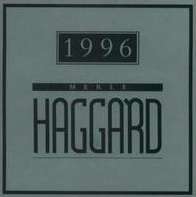1996 (Merle Haggard album)
1996 is the forty-ninth studio album by American country singer Merle Haggard, released in 1996. It was his last studio album on the Curb Records label, and was considered something of a return to form for Haggard despite poor sales.[1]
| 1996 | ||||
|---|---|---|---|---|
 | ||||
| Studio album by | ||||
| Released | January 23, 1996 | |||
| Recorded | 1995 | |||
| Genre | Country | |||
| Length | 32:05 | |||
| Label | Curb | |||
| Producer | Lou Bradley, Abe Manuel, Jr., Merle Haggard | |||
| Merle Haggard chronology | ||||
| ||||
| Singles from 1996 | ||||
| ||||
Background
Despite good reviews, 1996 was the first studio album in Haggard's career not to chart. Curb's indifference to the release is commonly cited as a major factor in the LP's commercial failure, with country music critic, journalist and historian Michael McCall summarizing the situation in his AllMusic review of the album: "His record company didn't send promotional copies to reviewers until the album had been out for nearly a month, and no advertising or promotion has been devoted to the music. The album artwork and cover reflect this lack of care: the title, 1996, is boxed on the cover like a tomb, exactly like Hag's last set, 1994."[1] In his 2013 Haggard biography The Running Kind David Cantwell adds, "To be a singer and a writer with next to zero chance of being heard was maddening enough. That 1996 boasted several strong new originals only compounded the frustration."[2] On "Beer Can Hill," a song that celebrates his Bakersfield roots, Haggard is joined by Dwight Yoakam and fellow country legend Buck Owens. 1996 also features contributions from John Anderson, Iris Dement, and Johnny Paycheck.
Reception
| Review scores | |
|---|---|
| Source | Rating |
| Allmusic | |
Michael McCall of AllMusic writes, "Recorded in Bakersfield, Haggard's album takes a jaunty yet melancholy look at a middle-aged man's concerns... The album's standout is a cover of Iris Dement's great 'No Time to Cry,' which Haggard fills with aged, tired wisdom."[1]
Track listing
- "Sin City Blues" (Merle Haggard, Theresa Lane Haggard, Joe Manuel) – 2:28
- "No Time to Cry" (Iris Dement) – 4:25
- "Beer Can Hill" (Haggard, Abe Manuel, Jr.) – 3:16
- "Truck Drivers' Blues" (Haggard, Tim Howard) – 3:04
- "Too Many Highways" (Haggard, Max D. Barnes) – 2:59
- "Five Days a Week" (Haggard) – 2:13
- "Kids Get Lonesome Too" (Haggard, Lou Bradley) – 3:00
- "If Anyone Ought to Know" (Haggard, Bonnie Owens) – 3:03
- "Untanglin' My Mind" (Haggard, Clint Black) – 4:09
- "Winds of Change" (Haggard, Terry Hardesty) – 3:28
Personnel
- Merle Haggard – vocals, guitar
- Norm Hamlet – steel guitar, dobro
- Biff Adams – drums
- Mark Yeary – piano
- Don Markham – trumpet, saxophone, penny whistle
- Jim Belkins – violin
- Clint Strong – guitar
- John Anderson – vocals
- Dwight Yoakam – vocals
- Buck Owens – vocals
- Johnny Paycheck – vocals
- Seymour Duncan – guitar
- Eddie Curtis – bass
- Iris DeMent – piano
- Hilton Reed – guitar, bass, background vocals
- Oleg Schramm – piano
- Dawn Sears – background vocals
- Leland Sklar – bass
- Bob Teague – vocals
- Bobby Wood – electric piano
- Terry Hardesty – guitar
- Tim Howard – guitar
- Abe Manuel, Jr. – guitar, fiddle, percussion, accordion, harmony vocals
- Joe Manuel – guitar, background vocals
Production notes:
- Lou Bradley – producer, engineer
- Merle Haggard – producer
- Abe Manuel, Jr. – producer
References
- McCall, Michael. "1996 > Review". Allmusic. Retrieved March 16, 2015.
- Cantwell, David (2013). Merle Haggard: The Running Kind. University of Texas Press. ISBN 978-0-292-71771-8.